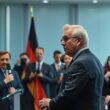The recent ceasefire between Israel and Hamas has been hailed by former US President Donald Trump as the dawn of a “golden age” for the region, a characterization that has drawn both praise and skepticism within Israel and internationally. During a brief visit to the Knesset on Monday, Trump delivered a speech punctuated by prolonged standing ovations and the distribution of “Trump the peace president” baseball caps among parliamentarians, reflecting a sentiment of profound gratitude among many within the Israeli government.
Trump’s address framed the ceasefire not merely as an end to hostilities, but as a symbolic closure to an era defined by “terror and death” and a decisive step towards a future characterized by “faith, hope and God”. He extended specific recognition to nations within the Arab and Muslim world, crediting their collective pressure on Hamas for the release of hostages and ultimately facilitating the agreement.
Israeli Prime Minister Benjamin Netanyahu echoed Trump’s enthusiastic appraisal, lavishing praise on the former president and predicting his name would be etched into both Israeli and global history books. He connected Trump’s involvement directly to a proposed peace plan, which Netanyahu described as potentially “opening the door to a historical expansion of peace” in the Middle East.
The lavish welcome extended to Trump underscores the significant political capital he retains within certain Israeli circles, despite ongoing international criticism surrounding his policies and rhetoric. However, the celebratory atmosphere was not universal. A disruption during Trump’s address by a left-wing Knesset member, swiftly removed by security personnel, highlighted the existence of dissenting voices who likely view the situation as considerably more complex.
The subsequent journey to Sharm el-Sheikh, Egypt, for a scheduled “Middle East peace ceremony” signifies an attempt to solidify the momentum from the ceasefire. However, the inherent fragility of such agreements, coupled with Trump’s optimistic, almost evangelical, pronouncements, raise critical questions about the long-term viability of lasting peace. Political analysts have pointed out that this carefully orchestrated display risks overlooking the deep-seated grievances and power dynamics that fueled the conflict in the first place, potentially undermining any genuine prospect of a lasting resolution. The Nobel Peace Prize speculation, championed by opposition leader Jair Lapid, further underscores the politically charged nature of the visit and the calculated effort to leverage the perceived goodwill surrounding Trump’s involvement.





